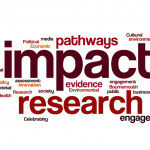Join us on Tuesday 24 May and Thursday 26 May to find out how researchers can reach a wider audience and effectively use the media to increase the impact of their research.
The PR Team here at BU will take you through traditional and social media channels that can be used to communicate your research findings to both the general public and more specialised audiences. You will receive tips on how to work effectively with the media and find out how BU can support this process.
Dr Sarah Bate will then talk you through her experiences of engaging with the media, presenting a key impact case study that has extensively used the media to generate and evidence impact.
Book your place via Eventbrite:
Tuesday 24 May – Lansdowne
Thursday 26 May – Talbot
The session will take place on Tuesday 24 May in the Executive Business Centre (EB306) Lansdowne campus from 12.30 – 14.00, and will be repeated on Thursday 26 May in Kimmeridge House (KG03) Talbot campus from 13.30 – 15.00.

This session forms part of a series of research impact seminars and workshops, organised by RKEO to explore the various pathways to achieving societal and economic impact. Within the series, attendees will explore methods for effectively engaging a variety of research users throughout the research process, and develop new ways to plan, deliver and evidence impact.
View the other events in the series or email Genna West for further information.
 What makes good evidence of research impact?
What makes good evidence of research impact? Celebrating research impact at Bournemouth University
Celebrating research impact at Bournemouth University How can research impact support your career?
How can research impact support your career?










 SPROUT: From Sustainable Research to Sustainable Research Lives
SPROUT: From Sustainable Research to Sustainable Research Lives BRIAN upgrade and new look
BRIAN upgrade and new look Seeing the fruits of your labour in Bangladesh
Seeing the fruits of your labour in Bangladesh Exploring Embodied Research: Body Map Storytelling Workshop & Research Seminar
Exploring Embodied Research: Body Map Storytelling Workshop & Research Seminar Marking a Milestone: The Swash Channel Wreck Book Launch
Marking a Milestone: The Swash Channel Wreck Book Launch ECR Funding Open Call: Research Culture & Community Grant – Application Deadline Friday 12 December
ECR Funding Open Call: Research Culture & Community Grant – Application Deadline Friday 12 December MSCA Postdoctoral Fellowships 2025 Call
MSCA Postdoctoral Fellowships 2025 Call ERC Advanced Grant 2025 Webinar
ERC Advanced Grant 2025 Webinar Update on UKRO services
Update on UKRO services European research project exploring use of ‘virtual twins’ to better manage metabolic associated fatty liver disease
European research project exploring use of ‘virtual twins’ to better manage metabolic associated fatty liver disease